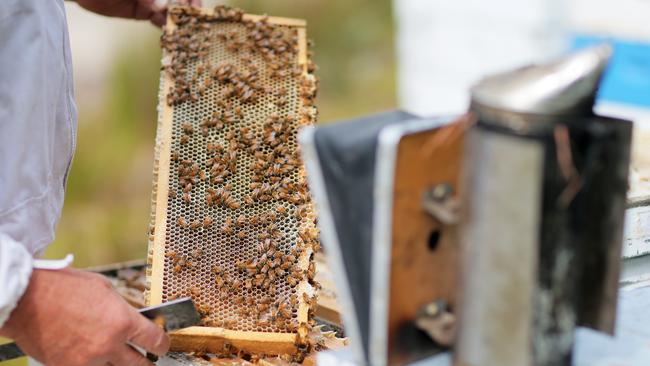Price of Tasmanian leatherwood honey set to soar after bushfires destroy ‘production zones’
UPDATED: The state’s commercial beekeeping industry would collapse without leatherwood honey, Tasmanian Beekeepers Association vice president Peter Norris says.

Tasmania
Don't miss out on the headlines from Tasmania. Followed categories will be added to My News.
THE price of Tasmanian leatherwood honey is set to skyrocket as dry conditions and bushfires continue to deliver the industry’s worst season in 35 years.
In a huge blow to beekeepers, the fires have wiped out an unknown number of hives and leatherwood trees on the western side of the state.
Leatherwood lovers have been told to stock up on their favourite products, with demand expected to outweigh supply in the near future.
Up to 70 per cent of the state’s honey is from leatherwood, with the tree’s plentiful flowers producing an abundant amount of nectar favoured by bees.
The unique rainforest tree is native and restricted to Tasmania’s cold and remote wilderness, including areas which have suffered significant damage as part of the Gell River, Tahune and West Coast blazes.

Unprecedented heatwaves also delivered Tasmania’s driest January on record, further affecting the annual leatherwood harvest, which occurs between January and March.
The Tasmanian Honey Company owner Julian Wolfhagen, who specialises in the production of “wild and uncompromised” leatherwood honey, said above average temperatures had caused the flower to dry up before bees had time to collect.
MORE NEWS:
PM’S PLEA FOR TOURISTS TO KEEP COMING TO TASSIE
WHICH SUBJECTS TO CHOOSE FOR A TOP TCE SCORE
“I don’t think I’ve seen a season like this before in my 35 years in the industry,” he said.
“It’s dry as a chip and our crop will be minimal.
“I don’t use the term lightly but these bushfires could be catastrophic. We’ve potentially lost significant areas of leatherwood forest that will take hundreds of years to recover.
“I imagine leatherwood will disappear from the shelves soon. If you depend on it, buy it in a hurry and get as much as you can.”
Mr Wolfhagen is one of several apiarists who today inspected their hives in the Southwest National Park for the first time since lightning strikes sparked a fire in the Tasmanian Wilderness World Heritage Area on December 28.
He said any loss of the “major leatherwood production zone” would hurt one of Tasmania’s most iconic exports.
“Tasmania is the only place in the world where leatherwood honey is produced. It’s the basis of our commercial existence,” Mr Wolfhagen said.
Mr Wolfhagen said he’d received calls from a number of other beekeepers who are in “dire straits” and were relying on this year’s crop to survive.

Tasmanian Beekeepers Association vice president Peter Norris described the leatherwood honey shortage as “a total disaster”.
The Heritage Honey co-owner said crop levels across the state were down about 75 per cent, causing prices to inflate already.
Mr Norris said a “crisis meeting” had been scheduled in March for Tasmanian apiarists feeling the financial hit.
“Leatherwood honey will be scarce for years to come,” Mr Norris said.
“We can bounce back and replace the hives we’ve lost, but if we haven’t got the leatherwood, we don’t have a commercial beekeeping industry in Tasmania.”
Mr Norris said the industry was calling for a “proactive, not reactive” government, which would invest in more advanced firefighting equipment to extinguish the blazes before they became uncontrollable.
Police, Fire and Emergency Management minister Michael Ferguson said a range of industries had been impacted but seeking to “cast blame” undermined the important and exhaustive work which was still ongoing.
“The TFS hit all new fires hard and early with a heavy weight of attack, including from the air,” Mr Ferguson said.


